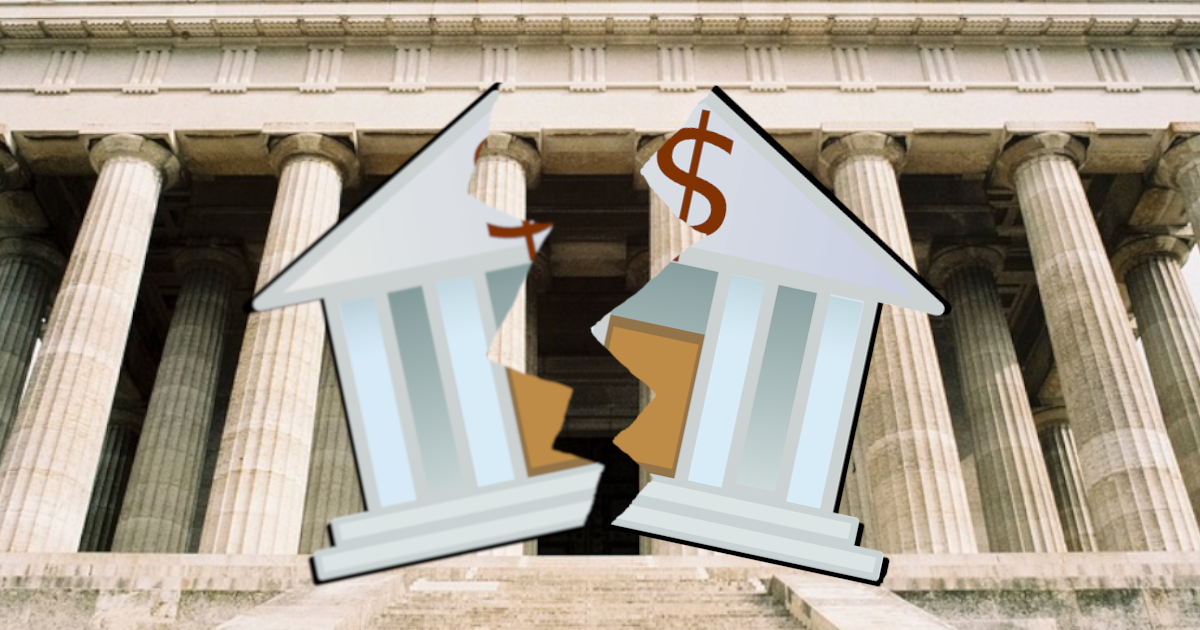

Banks Collapse:
Fed Stands Firm
Banking Bedlam...
March was a tumultuous month for the global banking sector, and jitters about the possibility of spreading fallout weighed on stocks, particularly shares of small and mid-sized banks. With wide exposure to domestic regional banks, the Russell 2000 small cap index has been the hardest hit of all the major stock indices. After a cascade of crypto-lender crashes started in 2022, Silvergate Capital became the first traditional bank to fall in the wake of the stunning collapse of crypto exchange FTX. Silvergate had been expanding in the crypto space, operating a crypto-based payment system. When Silvergate announced liquidation plans on March 8, analysts cited the bank’s legal liabilities related to FTX's bankruptcy. Though Silvergate was more focused on crypto than the banks that would falter in its wake, Silvergate’s demise sparked a panic about banks with high levels of uninsured deposits. The day after Silvergate announced plans to wind down, shares of Silicon Valley Bank (SVB) plummeted after the company failed to raise money to increase liquidity. By the end of the day, the bank was faced with $42 billion in customer withdrawals. Regulators seized the bank and shut it down the next day in the largest bank failure since Washington Mutual closed in 2008.
Ides of March
Signature Bank, which also provided crypto-related services but had been pivoting away from crypto, experienced a deposit run the same Friday that SVB was seized. By Sunday, regulators had also taken control of Signature, making it the third largest failed US bank in history. Wealthy clients of First Republic bank also started moving money to larger institutions, as nervousness spread around banks with high amounts of accounts above the standard Federal Deposit Insurance Corporation’s (FDIC) insured amount of $250,000. First Republic narrowly avoided going bust after a $30 billion lifeline from some of the country's largest lenders including JP Morgan Chase and Morgan Stanley helped it stay afloat. By March 15, bank jitters had gone global, as shares of Swiss bank Credit Suisse hit an all-time low after its largest investor said it could no longer provide financing to the bank. On Sunday March 19, some of the world's largest central banks came together to broker a deal in which UBS, the largest private bank in the world, would buy its 167-year-old rival Credit Suisse to stem further banking sector fallout.
Fed Not Fretting
Some thought the banking turmoil would cause the Fed to pause their interest rate hiking cycle to avoid causing any further financial fallout. However, on March 22, the Fed made an additional quarter-percent increase to rates. Fed Chair Jerome Powell acknowledged that a potential credit crunch from the banking industry stress may act as “the equivalent of a rate hike” or perhaps even more. Though Fed officials voiced concern about the banking turbulence, they said the bank busts were not due to collective issues in the overall banking sector. Banks hit hardest in March catered to wealthy clients and had high rates of uninsured deposits above the FDIC $250,000 limit. First Republic was reported to have 68 percent of its deposits as uninsured. While the amount of First Republic’s uninsured deposits was higher than the average regional bank, it was much smaller than those of SVB and Signature, which had uninsured levels of 94 and 90 percent, respectively.
Regulatory Rollback…
In addition to its high levels of uninsured deposits, SVB had a large, un-hedged portfolio of long-dated treasuries that lost value as interest rates rose. Though holding treasuries is common for a bank, failing to hedge and manage the duration risk of those holdings is highly unusual. As for Credit Suisse, its rescue did not seem to come as a surprise to markets, as the bank had been engulfed in troubles for years, and its demise was widely seen as unrelated to the reasons SVB and other US banks faltered. As regulators begin investigating March’s banking bedlam, some have pointed to a 2018 bank deregulation that rolled back parts of the Dodd-Frank Act and relaxed oversight for mid-sized banks with less than $250 billion in assets, which included SVB and Signature. Perhaps ironically, a board member of Signature Bank, Barney Frank, helped draft the landmark Dodd-Frank Act passed in the aftermath of the 2008 financial crisis.
April 5, 2023
Markets Demystified is published the first and third Wednesdays of each month, and explores how stock market investing can relate to personal finance.
Thanks for Reading!
Sincerely,
Jonathon Oden
Owner | Aesop Advisor LLC
Aesop Advisor LLC advertisements including newsletters and other publications are for informational purposes only. They do not attempt to predict future stock market moves and are not intended as individual investment advice. Aesop Advisor LLC newsletters and publications are not recommendations to buy, sell or hold any asset and are not intended as actionable investment advice or market timing. Equities references generally refer to the overall stock market, though if individual companies are mentioned, it is not a recommendation to buy, sell, or hold shares of the company. Unless otherwise indicated, terms including "stocks", the "stock market", and "market(s)" refer to Standard & Poor's 500 index. All investments involve risk and the past performance of a security or financial product does not guarantee future results or returns. While diversification may help spread risk, it does not assure a profit or protect against loss. There is always the potential of losing money when you invest in securities or other financial products. Publications and advertisements from Aesop Advisor LLC are not intended as investment, legal, or tax advice. Although gathered from sources believed to be reliable, Aesop Advisor LLC cannot guarantee the accuracy and completeness of data or information presented in publications and advertisements. This is an advertisement.